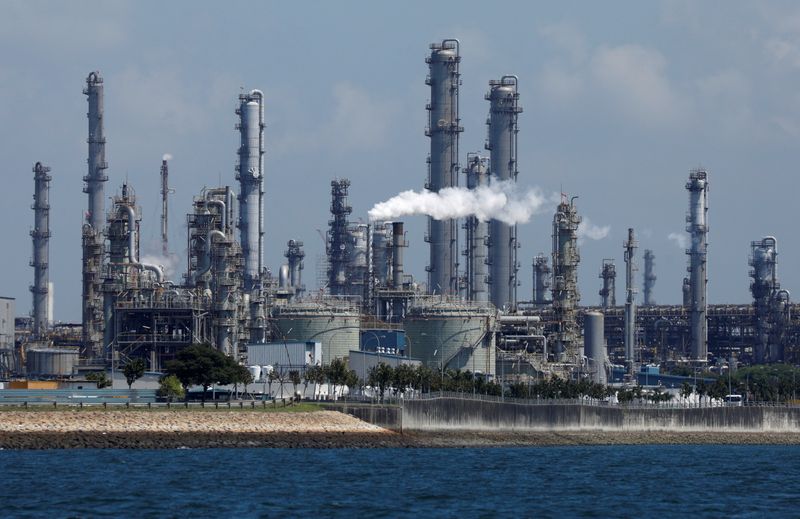By Florence Tan
SINGAPORE (Reuters) - Royal Dutch Shell (LON:RDSa) has halved its crude processing capacity at its Singapore hub and reduced fuel exports, executives said on Tuesday, as the major transits from fossil fuels to cut emissions and meet global low-carbon energy needs.
The refinery on Pulau Bukom will continue to produce naphtha for its ethylene unit, Shirley Yap, senior vice president of chemicals and products at Shell Singapore, told reporters.
Shell has also started testing new chemical feedstocks - pyrolysis oil and bionaphtha - at the cracker, she said, as the major aims to supply olefins with lower carbon footprint to customers like Japanese chemical maker Asahi Kasei Corp.
Shell is a key fuel supplier in Asia and the drop in exports has tightened supplies and propelled margins for refiners in the region back to pre-pandemic levels in recent months.
"The reality is that we've cut a substantial part of our capacity and there's demand for fuels today so we have to ensure that we are doing it at a pace that is in step with our customers and in step with the society," Shell Singapore Chairman Aw Kah Peng said.
"But at the same time ... it can't be turned on with just a flick of the switch as infrastructure needs to be build but we want to be there as quickly as we can," she said.
Shell will build its first pyrolysis oil upgrader to produce 50,000 tonnes per year (tpy) of treated pyrolysis oil for its 800,000 tpy cracker on Bukom in 2023.
Pyrolysis melts plastic waste into products such as pyrolysis oil, which can be upgraded as raw material for plastics and chemicals, although the process isn't commercially proven and consumes a lot of energy.
Other projects in Shell Singapore's pipeline include a carbon capture and storage (CCS) hub and a 550,000 tpy biofuels plant to process waste and vegetable oils into sustainable aviation fuel (SAF). Shell aims to make about 2 million tpy of SAF by 2025 globally although SAF accounts for less than 0.1% of today's global jet fuel demand.
The projects form part of Shell Singapore's plans to cut emissions from its operations by half by 2030, from 2016 levels on a net basis, Shell Downstream Director Huibert Vigeveno said.
Shell did not provide investment figures for the projects.
Energy companies are face increasing pressure from investors, activists and governments to steer away from fossil fuels and rapidly ramp up investment in renewables.
Globally, Shell has pledged to halve emissions from its operations by 2030, as well as reduce its net carbon footprint by 45% by 2035.
Bukom, together with other Shell chemical plants on Jurong Island, forms one of five Energy and Chemical Parks owned by the major globally and is the only one in Asia.

Shell plans to build two chemical conversion units in Asia to convert waste plastics into pyrolysis oil for Singapore, similar to units in the Netherlands with joint venture partner BlueAlp which will be operational in 2023.
Shell previously announced it would trial the use of hydrogen fuel cells for ships in Singapore and is exploring developing a solar farm in a landfill near Bukom.